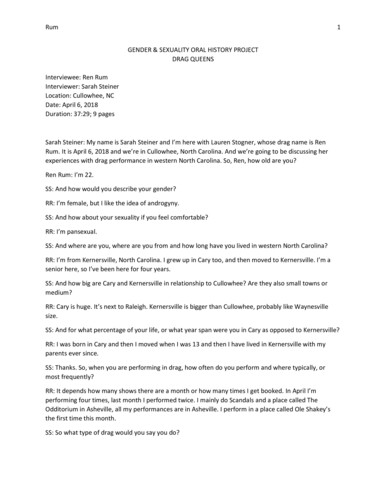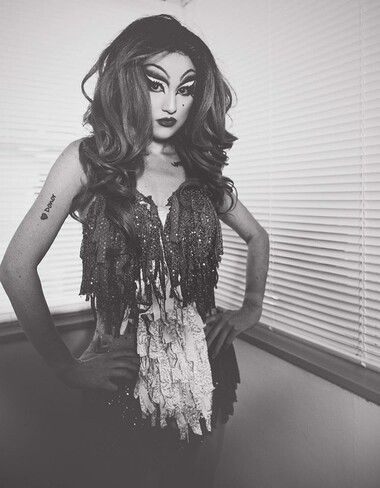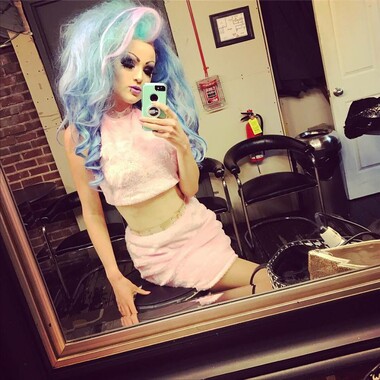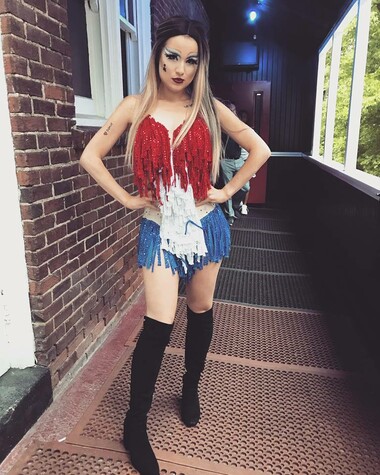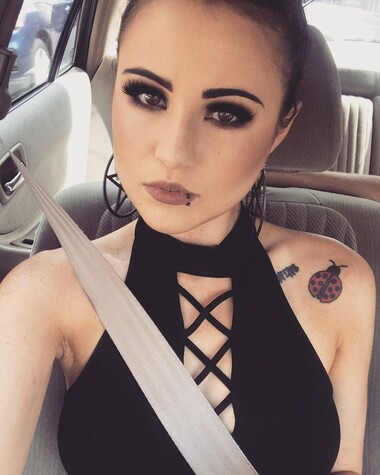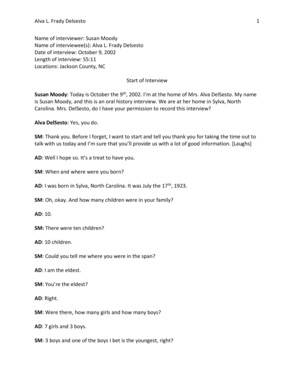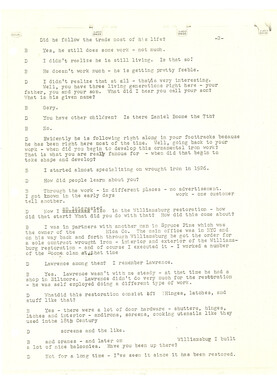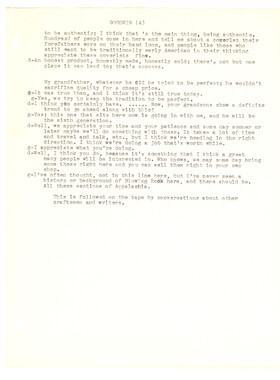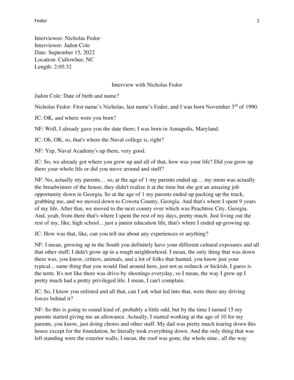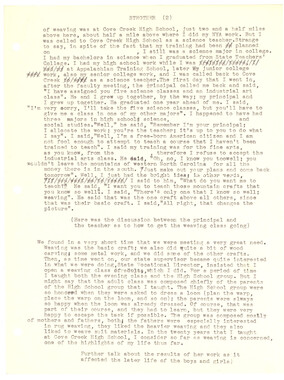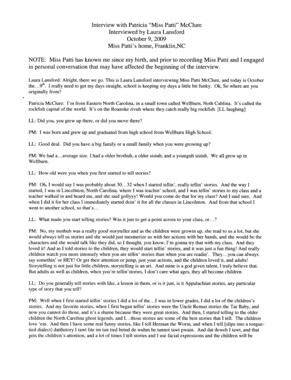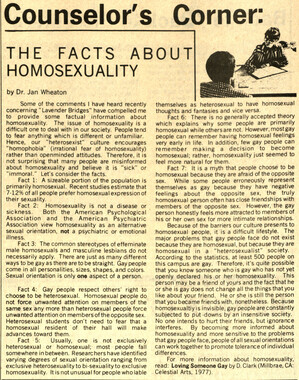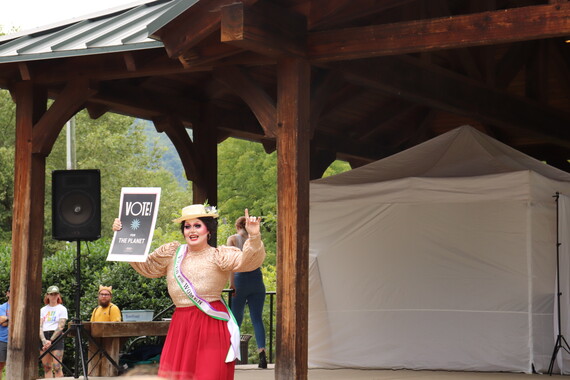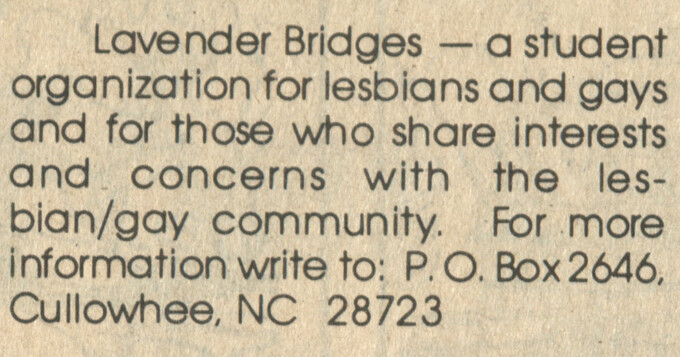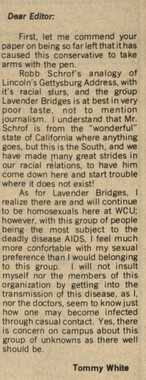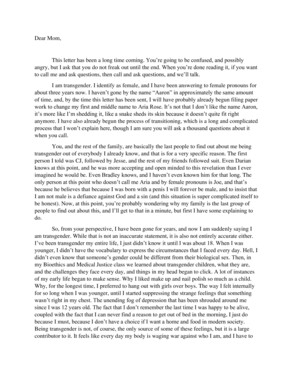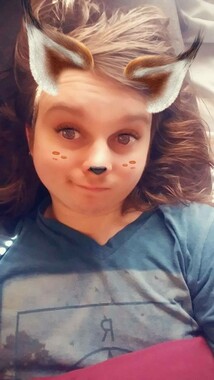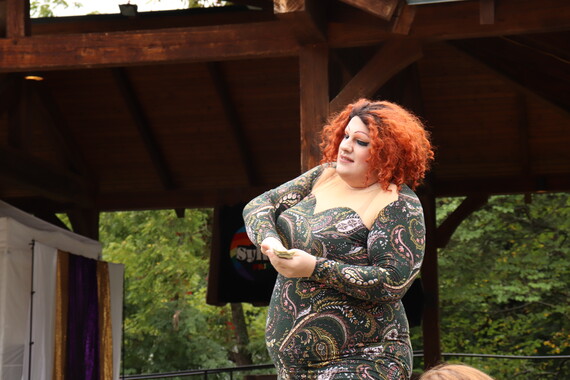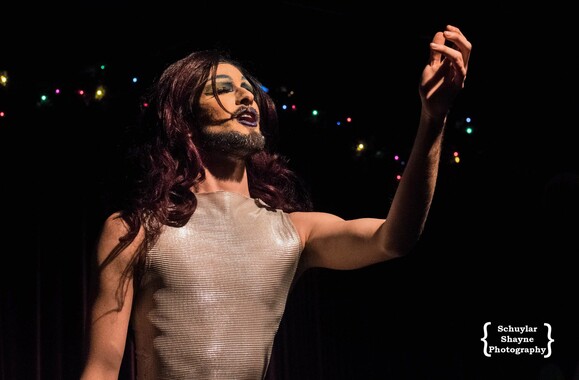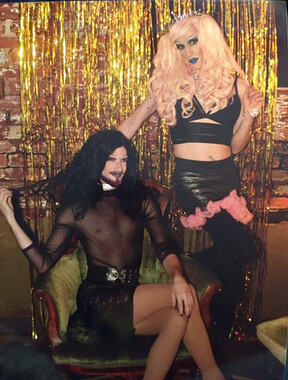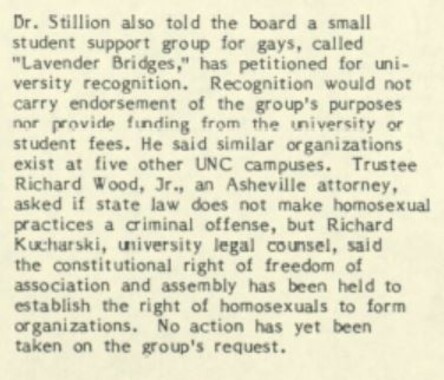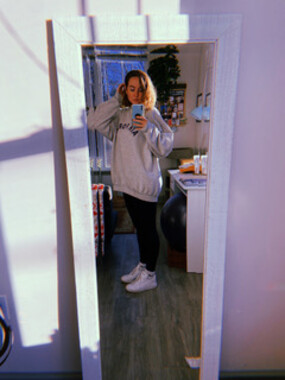Western Carolina University (20)
View all
- Canton Champion Fibre Company (2308)
- Cherokee Traditions (293)
- Civil War in Southern Appalachia (165)
- Craft Revival (1942)
- Great Smoky Mountains - A Park for America (2683)
- Highlights from Western Carolina University (430)
- Horace Kephart (941)
- Journeys Through Jackson (154)
- LGBTQIA+ Archive of Jackson County (15)
- Oral Histories of Western North Carolina (314)
- Picturing Appalachia (6679)
- Stories of Mountain Folk (413)
- Travel Western North Carolina (160)
- Western Carolina University Fine Art Museum Vitreograph Collection (129)
- Western Carolina University Herbarium (92)
- Western Carolina University: Making Memories (708)
- Western Carolina University Publications (2283)
- Western Carolina University Restricted Electronic Theses and Dissertations (146)
- Western North Carolina Regional Maps (71)
- World War II in Southern Appalachia (131)
University of North Carolina Asheville (6)
View all
- 1950s (1)
- 1960s (1)
- 1970s (2)
- 1980s (52)
- 1990s (10)
- 2000s (11)
- 2010s (19)
- 2020s (39)
- 1600s (0)
- 1700s (0)
- 1800s (0)
- 1810s (0)
- 1820s (0)
- 1830s (0)
- 1840s (0)
- 1850s (0)
- 1860s (0)
- 1870s (0)
- 1880s (0)
- 1890s (0)
- 1900s (0)
- 1910s (0)
- 1920s (0)
- 1930s (0)
- 1940s (0)
- Asheville (N.C.) (1)
- Buncombe County (N.C.) (4)
- Jackson County (N.C.) (95)
- Appalachian Region, Southern (0)
- Avery County (N.C.) (0)
- Blount County (Tenn.) (0)
- Cherokee County (N.C.) (0)
- Clay County (N.C.) (0)
- Graham County (N.C.) (0)
- Great Smoky Mountains National Park (N.C. and Tenn.) (0)
- Haywood County (N.C.) (0)
- Henderson County (N.C.) (0)
- Knox County (Tenn.) (0)
- Knoxville (Tenn.) (0)
- Lake Santeetlah (N.C.) (0)
- Macon County (N.C.) (0)
- Madison County (N.C.) (0)
- McDowell County (N.C.) (0)
- Mitchell County (N.C.) (0)
- Polk County (N.C.) (0)
- Qualla Boundary (0)
- Rutherford County (N.C.) (0)
- Swain County (N.C.) (0)
- Transylvania County (N.C.) (0)
- Watauga County (N.C.) (0)
- Waynesville (N.C.) (0)
- Yancey County (N.C.) (0)
- Clippings (information Artifacts) (47)
- Interviews (28)
- Photographs (31)
- Sound Recordings (25)
- Transcripts (28)
- Video Recordings (physical Artifacts) (5)
- Aerial Photographs (0)
- Aerial Views (0)
- Albums (books) (0)
- Articles (0)
- Artifacts (object Genre) (0)
- Biography (general Genre) (0)
- Cards (information Artifacts) (0)
- Crafts (art Genres) (0)
- Depictions (visual Works) (0)
- Design Drawings (0)
- Drawings (visual Works) (0)
- Envelopes (0)
- Facsimiles (reproductions) (0)
- Fiction (general Genre) (0)
- Financial Records (0)
- Fliers (printed Matter) (0)
- Glass Plate Negatives (0)
- Guidebooks (0)
- Internegatives (0)
- Land Surveys (0)
- Letters (correspondence) (0)
- Manuscripts (documents) (0)
- Maps (documents) (0)
- Memorandums (0)
- Minutes (administrative Records) (0)
- Negatives (photographs) (0)
- Newsletters (0)
- Newspapers (0)
- Occupation Currency (0)
- Paintings (visual Works) (0)
- Pen And Ink Drawings (0)
- Periodicals (0)
- Personal Narratives (0)
- Plans (maps) (0)
- Poetry (0)
- Portraits (0)
- Postcards (0)
- Programs (documents) (0)
- Publications (documents) (0)
- Questionnaires (0)
- Scrapbooks (0)
- Sheet Music (0)
- Slides (photographs) (0)
- Specimens (0)
- Speeches (documents) (0)
- Text Messages (0)
- Tintypes (photographs) (0)
- Vitreographs (0)
- WCU Gender and Sexuality Oral History Project (27)
- A.L. Ensley Collection (0)
- Appalachian Industrial School Records (0)
- Appalachian National Park Association Records (0)
- Axley-Meroney Collection (0)
- Bayard Wootten Photograph Collection (0)
- Bethel Rural Community Organization Collection (0)
- Blumer Collection (0)
- C.W. Slagle Collection (0)
- Canton Area Historical Museum (0)
- Carlos C. Campbell Collection (0)
- Cataloochee History Project (0)
- Cherokee Studies Collection (0)
- Daisy Dame Photograph Album (0)
- Daniel Boone VI Collection (0)
- Doris Ulmann Photograph Collection (0)
- Elizabeth H. Lasley Collection (0)
- Elizabeth Woolworth Szold Fleharty Collection (0)
- Frank Fry Collection (0)
- George Masa Collection (0)
- Gideon Laney Collection (0)
- Hazel Scarborough Collection (0)
- Hiram C. Wilburn Papers (0)
- Historic Photographs Collection (0)
- Horace Kephart Collection (0)
- Humbard Collection (0)
- Hunter and Weaver Families Collection (0)
- I. D. Blumenthal Collection (0)
- Isadora Williams Collection (0)
- Jesse Bryson Stalcup Collection (0)
- Jim Thompson Collection (0)
- John B. Battle Collection (0)
- John C. Campbell Folk School Records (0)
- John Parris Collection (0)
- Judaculla Rock project (0)
- Kelly Bennett Collection (0)
- Love Family Papers (0)
- Major Wiley Parris Civil War Letters (0)
- Map Collection (0)
- McFee-Misemer Civil War Letters (0)
- Mountain Heritage Center Collection (0)
- Norburn - Robertson - Thomson Families Collection (0)
- Pauline Hood Collection (0)
- Pre-Guild Collection (0)
- Qualla Arts and Crafts Mutual Collection (0)
- R.A. Romanes Collection (0)
- Rosser H. Taylor Collection (0)
- Samuel Robert Owens Collection (0)
- Sara Madison Collection (0)
- Sherrill Studio Photo Collection (0)
- Smoky Mountains Hiking Club Collection (0)
- Stories of Mountain Folk - Radio Programs (0)
- The Reporter, Western Carolina University (0)
- Venoy and Elizabeth Reed Collection (0)
- WCU Mountain Heritage Center Oral Histories (0)
- WCU Oral History Collection - Mountain People, Mountain Lives (0)
- WCU Students Newspapers Collection (0)
- Western North Carolina Tomorrow Black Oral History Project (0)
- William Williams Stringfield Collection (0)
- Zebulon Weaver Collection (0)
- College student newspapers and periodicals (46)
- Gender nonconformity (4)
- African Americans (0)
- Appalachian Trail (0)
- Artisans (0)
- Cherokee art (0)
- Cherokee artists -- North Carolina (0)
- Cherokee language (0)
- Cherokee pottery (0)
- Cherokee women (0)
- Church buildings (0)
- Civilian Conservation Corps (U.S.) (0)
- Dams (0)
- Dance (0)
- Education (0)
- Floods (0)
- Folk music (0)
- Forced removal, 1813-1903 (0)
- Forest conservation (0)
- Forests and forestry (0)
- Great Smoky Mountains National Park (N.C. and Tenn.) (0)
- Hunting (0)
- Landscape photography (0)
- Logging (0)
- Maps (0)
- Mines and mineral resources (0)
- North Carolina -- Maps (0)
- Paper industry (0)
- Postcards (0)
- Pottery (0)
- Railroad trains (0)
- Rural electrification -- North Carolina, Western (0)
- School integration -- Southern States (0)
- Segregation -- North Carolina, Western (0)
- Slavery (0)
- Sports (0)
- Storytelling (0)
- Waterfalls -- Great Smoky Mountains (N.C. and Tenn.) (0)
- Weaving -- Appalachian Region, Southern (0)
- Wood-carving -- Appalachian Region, Southern (0)
- World War, 1939-1945 (0)
Interview with Ren Rum
Item
Item’s are ‘child’ level descriptions to ‘parent’ objects, (e.g. one page of a whole book).
-
-
Rum 1 GENDER & SEXUALITY ORAL HISTORY PROJECT DRAG QUEENS Interviewee: Ren Rum Interviewer: Sarah Steiner Location: Cullowhee, NC Date: April 6, 2018 Duration: 37:29; 9 pages Sarah Steiner: My name is Sarah Steiner and I’m here with Lauren Stogner, whose drag name is Ren Rum. It is April 6, 2018 and we’re in Cullowhee, North Carolina. And we’re going to be discussing her experiences with drag performance in western North Carolina. So, Ren, how old are you? Ren Rum: I’m 22. SS: And how would you describe your gender? RR: I’m female, but I like the idea of androgyny. SS: And how about your sexuality if you feel comfortable? RR: I’m pansexual. SS: And where are you, where are you from and how long have you lived in western North Carolina? RR: I’m from Kernersville, North Carolina. I grew up in Cary too, and then moved to Kernersville. I’m a senior here, so I’ve been here for four years. SS: And how big are Cary and Kernersville in relationship to Cullowhee? Are they also small towns or medium? RR: Cary is huge. It’s next to Raleigh. Kernersville is bigger than Cullowhee, probably like Waynesville size. SS: And for what percentage of your life, or what year span were you in Cary as opposed to Kernersville? RR: I was born in Cary and then I moved when I was 13 and then I have lived in Kernersville with my parents ever since. SS: Thanks. So, when you are performing in drag, how often do you perform and where typically, or most frequently? RR: It depends how many shows there are a month or how many times I get booked. In April I’m performing four times, last month I performed twice. I mainly do Scandals and a place called The Odditorium in Asheville, all my performances are in Asheville. I perform in a place called Ole Shakey’s the first time this month. SS: So what type of drag would you say you do? Rum 2 RR: I do horror drag, I love to do political drag. Anything dark and creepy androgynous, stuff like that. I get inspiration from horror movies, politics, and just playing around with gender. I get a lot of slack, I’m not king enough, because it’s not masculine enough, but then I’m not queen enough because it’s not like super, I don’t wear padding or big breasts or anything like that. SS: Okay, tell me a little bit more about in what ways it’s political to you and how you integrate political inspiration? RR: Well I’m the current vice president of college democrats right now and politics are one of my loves. It has interested me since I was in middle school. And I’m very politically outspoken so I keep up to date with politics and everything. For me, LGBT rights and everything are huge political issues. Especially right now with Donald Trump being president I feel that as an activist I should make a statement and the best way I can make that is through an act. So last month I did one of my favorite acts. I did the song Bang Bang, by Green Day and it was an act about gun violence and so I had cardboard cutouts of AR-15s and several fake guns and everything. I had an American flag and a cut out of a TV screen with Breaking News written on it. And it was a statement how ridiculous the act that we go through whenever there’s a mass shooting with the response and then just the inaction. It was a call for action for gun reform. I donated all the money I made to the Parkland Foundation and also I find if you’re doing something that is controversial and political to begin with and you have an audience then you can make a statement and maybe somebody walks away from that performance going, maybe I should get more involved in this. SS: What is drag to you? RR: It’s an art form. And so it is a commentary on things like gender roles, on gender itself. For me it’s a lot about societal standards and what is considered beautiful or masculine. So when I go out there and I cover myself in blood it’s kind of saying screw you to the fact that you have to be proper and your makeup has to be perfect and your hair has to be perfect and all of that. It’s also a queer art form. But I do believe that people who are not queer can do drag. But to me it’s pretty much taking what society says you have to be and taking it to the extreme to the point that it’s almost comical. I mean it’s... we look at women’s beauty standards you have queens or hyper queens out there who are who have these huge lashes on, this exaggerated makeup this huge hair and nails and high heels and everything. It’s like wow, who would actually walk around like that, but then you realize that’s what women are expected to do. SS: Do you feel like that pressure exists in the drag community as well? RR: There definitely is... I’ve gotten some comments before that I’m not masculine enough to be a king because I’m not putting on a beard, or I’m not wearing clothes that make me look like a man or something that I’m wearing clothes that are too feminine. And then for queens there is a lot of - if you’re not wearing nails then you’re not doing drag. If you’re using your real hair, because a lot of times I do that, then that’s not drag. Or if your makeup is not big enough than that’s not drag. So there’s definitely a beauty standard within the drag community which is why I like places like The Odditorium where that’s not… you do your style of drag and nobody’s going to tell you, well that wasn’t pretty enough, that wasn’t masculine enough. SS: Anything else that you think it is, you mentioned art? Rum 3 RR: I think it’s a form of self-expression. I recently met a performer who identifies as a man, but performs as a female, a drag queen. He says that it is a way that he deals with gender dysphoria because he can take that kind of painful imagery and make it into an art form, and it’s an outlet. There’s a lot of performers that they struggle with issues related to their sexuality or their gender or their body and they use it as a form to express that. SS: Anything else? RR: Nope. SS: So what motivates you to perform? RR: My own imagination. One of my favorite parts of performing is when I get a booking and they are like okay well in two weeks we need you to be here and you’re going to do two numbers. And so I am immediately like okay, what am I going to do, so I pick my songs and for a week or so I’m like okay, I need to make this outfit, this is my performance, and if I have props I’m making those. So putting it together is a production and then getting to express that. And then having it be an outlet for… when I did the Bang Bang number, I was very angry about the Parkland shooting and so an outlet to express how I felt that was just beyond being like, oh I’m angry, this should never happen again on Facebook, or talking about it. And like I said, politics is huge and so when something happens in the country or in the world and I’m like that’s really messed up, or something that I’m really happy about, then I can make a performance surrounding that. SS: And you said you make your own outfits, to what level is that, is that pulling things together or sewing? RR: I cannot sew. Luckily Ginger is being very nice and helping me sew an outfit this weekend. I, right now, I bought a dress suit vest and I’m spray painting it with gold glitter for a number. So a lot of my stuff is customizing. So going to Goodwill, going to thrift stores, or looking through old costumes of mine, or stuff that I already have and modifying it so whether that is glue or cutting something up, or covering something in blood, which is my favorite thing to do, or spray painting it. I make a lot of my own props so stuff like that out of cardboard, or just hunting around and repurposing things for that. SS: So you’ve touched on this, who in your opinion can do drag? RR: I think anybody can do drag. You just have to have a persona or a character. I know that some people say that you have to be part of the queer community. I can see their point of view because a lot of people are bitter that it has become mainstream and now there are a whole bunch of people who identify as straight or cis that are coming into the community and taking away from the important aspects of the LGBT community. So I think if somebody is straight it’s just they need to realize this is an outlet for people who are not. And respect that and definitely you have to be respectful of the community because if you have issues with say people who are trans or something then you don’t need to be in their space. I do see, this is their space, but I am of the belief that you can do drag as long as it is a persona, there’s a message, you’re doing, obviously you can’t be like I’m going to put on a t-shirt and jeans and call that drag. Have your own style and it’s a performance. SS: So you mentioned trans performers specifically and there’s a little bit of controversy… RR: There’s a little bit of controversy yes. Rum 4 SS: So is that something that, is that another point of contention in the community? RR: It is for some, I know that right now there is a lot to do with RuPaul’s Drag Race not allowing trans gender women on if they are post hormone, post-surgery. I happen to know quite a few trans performers and they are amazing performers and I don’t think that you should be like well if you’re a trans female then you’re not really a drag queen. Or something because that’s still somebody of the LGBT community doing art and you know, I just think it’s ridiculous that people want to police that because I don’t… if you identify as a drag queen nobody should be like well technically you’re a hyper queen, or technically you’re not, I just think that’s ridiculous. Just let somebody identify their type of drag, how they want to identify it as. In the king world it’s actually very common that it is trans men. So most of the drag queens that I know are trans and I find it’s a little silly that that’s acceptable, but for queens it’s not so much acceptable and that’s kind of unfair. So I kind of disagree with the whole you can’t be trans and do drag. SS: Sure. Thanks. have your thoughts on who can drag changed over time? RR: I guess so, because when I first got into what drag was it was through the internet and RuPaul’s Drag Race and so I only knew about the queen’s side of it and I just assumed it was cis gender gay men who did it, and then when I actually got involved with community I realized that oh there are kings and I didn’t know what a hyper queen was or a hyper king until I started performing at Kingdom. And they were like oh this is a thing, I was like oh, that’s actually really cool. That would interest me. I was always like oh I wish I could do that, I could wear the drag queen stuff or whatever but I was like oh I can’t because I’m not a man. And so I think as I got more educated about drag I started being like, oh there is multiple types and everybody can find a place in it. SS: How did you choose your stage name and what’s it’s significance? RR: Obviously it’s a play on it’s Ren Rum which is a play on Red Rum, which is a famous horror movie. I’ve always liked horror stuff. It’s actually one of my screen names online. It’s my Instagram name Ren is the last part of Lauren so it’s my nickname at school with my friends. So I was asked what is your drag name and I was like oh my gosh what’s it gonna be. And I was like why don’t I just go with what it is online because I actually have a small following online for my cosplay which I’ve been doing for years now. I was like well people already know me as that online so if I just go by that then people are going to be like, oh they’re doing drag. So I was like oh, I like that name, so I’ll just go by that. SS: So that’s a really interesting perspective that I think might be worth digging into, how do you see those two worlds meshing, cosplay and drag, do they or…? RR: That’s a really interesting story because I do impersonation cosplays of real people. I’ve done, anime characters before, but my favorite is to do specifically band members. Male band members. So my main one is Andy Biersack from Black Veil Brides and I’ve been doing that cosplay for…. oh god, eight years now I think, since like, yeah, since like 2010. And I would enter cosplay competition to go to cosplay contests and I would always lose because I was a real person, not somebody else’s from a comic book and their character is super exaggerated because they’ve go armor and they’ve got all this stuff because you know it’s a cartoon. And so I couldn’t compete with it and I would get people telling me you’re not really cosplaying because you’re doing a real person and that’s just impersonation so you’re not cosplay. And I was like, okay, and then, but all the people I wanted to do were real. And there is a type of drag Rum 5 which is impersonation drag and you see it a lot in Vegas where you have the Britany Spears girl or stuff like that. So I was like what if I did more drag. And that’s why last year when the show was here, my friends were like you should go to the drag contest, because obviously you’re not... like in the cosplay world I enjoy it, I love the other cosplays, there are definitely are people that like what I do, but you know in the mainstream it wasn’t cosplay but it wasn’t like drag, but it was kind of like bridge over to drag and so I started out by just doing Andy which is what I did here. And then I started doing my own characters and expanding and doing other characters and stuff like that. So it’s kind of like, it’s more fitting for what I want to do. SS: Sure. Awesome, thanks. Can you remember the first time you were exposed to drag in film and also in person? RR: It’s pretty young, I come from a very liberal family. So like, I’ve known about it, I knew what drag queens were when I was a kid. But the really big one was I think around season four of RuPaul’s Drag Race is when I started watching it and that’s when me, my mom, and my sister really got into the show and everything. We all watched it together. I was big on MySpace when I was in middle school I was on Myspace and there was a lot of stuff on there that was essentially drag. So you had a lot of big personalities that were doing drag or very similar to drag and I always just, I loved it. I loved the androgynous looks and everything. And I was really big into the emo scene movement, and a lot of that leads into drag world and stuff like that. But it wasn’t until high school that I was like super getting into it. SS: Any particular people spring to mind when you’re talking about those gateway folks from MySpace? RR: Everybody, like Jeffree Star would be a big one. There’s been a lot of controversy about that, but that was one of the main ones. There was Chris Crocker, and then just anybody who is familiar with MySpace knows that big hair, big makeup. A lot of the themes that were in drag were also in MySpace. SS: What about in person? RR: In person, see I didn’t really… Cary doesn’t have the drags, not that I know of, it might. But it’s next to Raleigh and Durham and that’s where most of the nightlife is. So I didn’t meet any drag queens that I knew of when I was in Cary and then Kernersville is most definitely not somewhere you walk around in drag in. That’s along Winston and Greensboro. I would say the first time I got in-person introduced to drag was my freshman year here. My mom came down for the weekend, we were in Asheville, and we were looking for something to do Saturday night and all the stores were closed at Biltmore and we were like oh what do we do. And then we started looking stuff up and my mom was like there’s a drag bar here and I was like let’s go. And it was Scandals and we went there and there was a drag show and it was amazing, it was so much fun. I was like oh my gosh I had no idea that this would be around here and all this and everything. And I went there to watch a real live show and kind of interreact with some of the queens and then they started having drag shows here I think my sophomore year and I went to the shows here and everything. SS: Yeah. And you performed in the one this part year? RR: I performed in this one yes. Is that how you met your drag mother? Rum 6 SS: Yes, I met Ginger in the dressing room. I came pretty much already dressed in my Andy outfit in drag and I walked into the dressing room and Ginger was there and we started talking and she was like oh I really like this androgyny and all that, do you have a drag mom. I was like no, this is my first time ever being in drag. And she was like do you want one? And I was like yes, and she’s like, okay, you’re my drag kid. And I was like oh my god yes. And then after I performed two other queens named Priscilla and Toothless which is now the Grand Maw came up to me and said they liked it and they would like to see me perform in Asheville and I was like oh my gosh, alright. And then Ginger helped me start getting into it and that’s when I was introduced to Kingdom, which is run by Viktor Grimm at Scandals, and I did a show there and then that led in to me doing shows at The Odditorium and getting booked there and meeting all the performers there and starting to get into the scene. Cause my first performance that was not at school was in November at Scandals. SS: And what more can you tell us about your first time in drag? RR: It was really intimidating. I’ve been in cosplay and performed and done lip syncs before at conventions and then I’d go to concerts for the bands dressed up as them. And so like Warped Tour and all of that I will go head to toe in my leather in cosplay, normally as Andy, and those shows have [more than a thousand people], shows, thousand some people, so I was used to dressing up and having attention from people, because people thought it was so cool that I was dressed up as the singer in the band or whatever. But I had never performed, I didn’t do theater or anything really as a kid and so I was like okay, I’ve been to the drag shows previously, okay, I’ll do it cause screw it, just sign up and do it. And I was like okay I’m cool, and I got ready and I walked in there and saw all those people I was like oh my gosh, I was like one of the last performers. And so I was sitting there watching it and I was nervous and just like oh my gosh, what if I mess up, there are so many people here and I’ve never done this before. And then knowing that the professional drag queens are there and then like Ginger who had just adopted me and I was like she’s never seen me perform, what if I suck. And I get backstage and I was like okay, okay and I stepped out on stage and all of that went away and I just had an amazing time. My friend recorded it because I don’t remember any of it. And I watched the video and I was like okay, it’s not that bad. But it’s even now sometimes it’s like, now it’s more like I had a lot planned and I hope this works out. But it’s intimidating to go up there in front of people and at the bar sometimes people they are drunk, and they will tell you they don’t like that or something. But it’s intimidating to go up there in front of strangers. Here it was intimidating because I was like oh my gosh, my friends are in the audience, there are teachers here, if I make a fool in front of myself it is my school, but I was like it’s okay, I’m a senior and I graduate so if I act a fool it’s fine I won’t be here. SS: How does your drag identity relate to your out of drag identity? RR: When I’m not, when I’m at school I dress sweatshirt, leggings, stuff like that, go to the gym. So when I go out and go places I dress up borderline in drag and I have my whole life. My mom could tell anybody that from the time I was three years old I would dress up in wigs and makeup and clothes and put on shows for my mom, my dad, and sister, forcibly make them watch me. My whole life I guess I’ve done borderline drag. Sometimes I dressed up as a boy, sometimes as a girl. So when I go out, like last night when I went out to the show I had on a lace front wig, huge lashes, full face of makeup, clothes and all. I’ve always loved getting dressed up. I don’t believe in I want to do a simple eyeliner and go. No, if I’m putting on makeup it’s a two-hour affair and I don’t like my real hair because it’s curly and hard to deal with and all. So I’ve always… when I was in high school I wore wigs all the time. And then I just love Rum 7 turning myself into something different. So with makeup or clothes and stuff like that so it’s pretty close, if you see me and I’m going out to the mall or something it’s pretty close. SS: And when you’re getting ready, you talked about getting ready as being a full affair. Is that something that you do by yourself, or is it more of a family-oriented activity. RR: It depends, yesterday I get ready at my house. A lot of times for shows I’ll go over to Ginger’s house and get ready and she lives with another performer named Katarina. And so sometimes we’re all getting ready and so we’ll sit there and do our makeup and get ready and everything together. Which is lots of fun because if I mess up on something she can help me. But it just depends on the time, but I prefer getting ready with other people because you get to talk and like. Because during the show a lot of it is like, people are waiting to go on or something or interacting with people that are there and so, when you’re back in the dressing room getting ready, you can actually sit there and be like, oh how was your day, what have you been up to and stuff like that. SS: How is drag here in western North Carolina different from drag in other areas you’re familiar with? RR: Well, this is the only area that I’m familiar with so I haven’t actually gone anywhere else. I know Atlanta is huge. I really want to go down there. I know anywhere where there is a big city, it’s going to be big. There is a scene back home, Kernersville, Greensboro area but from what I’ve heard, it’s not very much welcoming of Kings. So I mean I haven’t tried get a show or anything, I’ve been to one. But and from what I’ve heard from other performers though, the bigger the city, the harder it is to get booked. So if you live in New York City or Vegas you are competing with the best of the best, and there are just so many people because LA, places like that, people flock there to do drag. So if you’re in a smaller city, not that Asheville is small, but it’s surrounded by small cities, than you may have a better chance as a beginner to actually get a platform than if you were starting out in LA you would have to know somebody. SS: So in your time in western North Carolina, really any part, what changes have you seen in receptiveness to drag in the LGBT community specifically? RR: It’s more accepted because it’s gone mainstream. RuPaul’s Drag Race is now on basic cable, while it used to be just the premium channels or you have to watch it online. It’s become a lot more open to other forms of drag. There are definitely still people who are very old school, this is the strict definition, but more welcoming of different types. So there are different bars have started doing it. I performed at The Odditorium, but it’s Party FOUL troupe that performs there, which is run by Priscilla Chambers and that troop specialized in drag that is otherwise not normally accepted. Scandals, I love Scandals, but it is a lot of pageant pretty mainstream drag. It caters to people who that’s their idea of drag when they come to a show and it’s beautiful and I definitely like that type of drag, but you’re not going to be out there doing some super political number covered in blood and all that. And so seeing things like Party FOUL pop up. The Grand Maw just started one, a freak show drag where you see different types, so it’s actually really nice in Asheville where you can now see all these different types and you can go to Scandals and you can see that beautiful pageant drag and you can go to The Odditorium and see something that’s very political or very out there. And so I guess the changes would be like more types are available now. Rum 8 SS: Yeah, sure. Do you feel like that’s echoed in the full population or are there differences in your perception in terms of acceptance? RR: Some people are coming around. Like I said, there’s definitely some people who are, drag is pageant, drag is traditional nails, hair, all that, Kings have beards and painted-on abs. And there’s nothing wrong with that, it’s beautiful, but I’ve seen a lot more people be like oh there’s other types. Or, okay, I understand that now. So hopefully that continues. Because it sucks if you’re a performer that’s not mainstream and you don’t like that type and then you’re like where’s my place, where can I perform. SS: What makes you happy day-to-day as a member of the drag community? RR: Seeing other people’s drag. I love watching other people’s performances and seeing what they’ve created and then having the support of a family of performers and a lot of them come from very diverse backgrounds. And just like seeing how other people express themselves. So last night I didn’t perform so I got to watch everybody’s act and just being like wow, I mean this is so cool, so captivating, entertaining and just makes me so happy to be around art and people being genuine. SS: What struggles do you encounter as a member of the community? RR: For me it’s like, I’m not king enough to be called king, but I’m not feminine enough to be like the drag queen hyper queen. Or that my style of drag is not really drag because some people don’t like impersonation, some people don’t like horror, stuff like that. I do a lot of metal rock music stuff and people are like, I want pop, I don’t like that type of music so. Or anytime you do a political number you run the risk of somebody being like, I don’t like that. Something like that. So there are definitely prejudices against certain types and then there are people that get mad if you do a certain style or you don’t do a certain style. Anywhere where you have a lot of people, and a lot of people are in the community are young so sometimes there is petty drama and stuff like that. And then there are some people who refuse to accept certain styles of drag so that can be a little bit frustrating sometimes. SS: How have your passion levels for maybe cosplay and drag, how have they changed with time, or have they changed with time? RR: Well I’ve always, well not always, but since I got introduced to drag I’ve always loved it and everything, but like I said, I didn’t know that I could do it. So it was always like this, guess I can’t, wish I could type thing. And then with cosplay, I’ve always liked cosplay, I was kind of getting, well I’m not technically doing cosplay I guess so it’s like I couldn’t really relate to a lot of the cosplayers even though I was very passionate about it because I didn’t know what anime they were talking about or I didn’t know what show it was from. So I felt like… and nobody knew who I was ever, there would be three people there who knew who I was out of like a couple of thousand people. And so after I started doing drag I cosplayed like I considered going to concerts and everything in the outfits as cosplay, but it’s more like drag now than it was cosplay I guess. SS: Have you ever thought about not doing it anymore? Like have you ever felt… you mentioned some people get angry about certain things, or they don’t like certain things. RR: I’ve like, I’ve definitely had times where I’m like, okay, this is getting me down because people are being mean. But I’m not somebody who, people don’t like it so I’m going to stop. No, I’m going to do it more because people don’t like it. So I’ve gotten hate before because I did a certain character and called Rum 9 names and stuff like that and accused of stuff and everything and I’ve been like maybe I should quit because clearly people don’t like me. But I’m not somebody who will… I’ll be well, oh well I liked my performance and if somebody didn’t like that then that’s on them. SS: Do you find yourself using different languages with other performers than you do with people at work or family members or friends who aren’t involved in the drag community? RR: Yeah, there is definitely a set of vocabulary that people don’t get. Like I said, my mom and my sister love drag and so I can talk to them and they understand what I’m saying. My sister is in high school so she picks up all types of slang and stuff like that. But if I talk to my grandparents, even though they are very supportive they’ll be like what did you just say, I don’t understand. But if I were to talk to somebody on campus that doesn’t do drag or isn’t in the community they would probably have no idea what I was talking about. I feel like because it’s mainstream a lot of the drag terminology and everything is becoming more common so like if you read somebody you’re kind of being shady, but that’s also a drag term. But I mean, you’re insulting them, but not really or something. But I think now a lot of people understands what that means and so it’s becoming easier. But there is definitely a different set of language. SS: Do you have any thoughts for other students who are maybe thinking about getting into drag? RR: Yes, they should do it. I was hesitant at first because I was like, I didn’t know there was a place for it. But if you want to do it and have a passion for it, then do it. There are outlets. If you are a female and you want to do either hyper queen or you want to do king, or if you’re… Kingdom is more for biological females and then trans men who are wanting, who started out as wanting to be king, but that included hyper queen and all that, that is something for amateurs, so you can contact Viktor Grimm and say I want to perform and you get a number and you can go out there and you can perform. There is another show that’s going to be starting up soon apparently, I don’t know the name of that one yet, it’s still in the early stages. If you go, Party FOUL has guests, if you go to some of these shows, and you are really wanting to get involved speak with the performers afterwards and be like, I’m new, I would like an opportunity and maybe they do. And then maybe they can help you, maybe one of them will adopt you. Don’t be scared to try it. And if you try it and you don’t like it, it’s not for you that’s fine. SS: Is there anything else that you would like to share that I haven’t asked about? RR: I guess my point I wrote down here is that all drag is valid, so if somebody, if you do something and somebody says, well that’s not drag, maybe that’s not drag to them, but if that’s drag to you that’s all that counts. And so, the other thing would be like, don’t tell somebody that their drag isn’t valid, and don’t tell something that their form of art isn’t okay because it’s not your standard because there are different types. That’s like saying if I like rock music, then rap or pop music isn’t music, and that’s not true, it’s just different. So don’t let anybody tell you what you can or should do. So if somebody comes up to you and says I know you like to do horror drag but you should really put on a gown and makeup and take off the blood. Then if you don’t want to do that be like no. So, be what you think drag is and don’t worry what other people think. SS: Awesome, thank you, anything else? RR: Nope.
Object
Object’s are ‘parent’ level descriptions to ‘children’ items, (e.g. a book with pages).
-
Lauren Stogner, stage name Ren Rum, is interviewed by Sarah Steiner as a part of the Gender and Sexuality Oral History project. Stogner is a pansexual female who does horror and cosplay drag as a king and has been dressing up, wearing wigs and performing for her family since she was 3. She performs at Scandals, The Odditorium, Ole Shakey’s and the Kingdom show at Scandals Nightclub. Stogner talks about using the stage for political activism and about being the vice president of College Democrats on the campus of Western Carolina University. Stogner also talks about cosplay, drag in a rural community, preparing to perform, meeting her drag mom, and performing for the first time. Includes additional photographs of Lauren Stogner in and out of drag.
-
